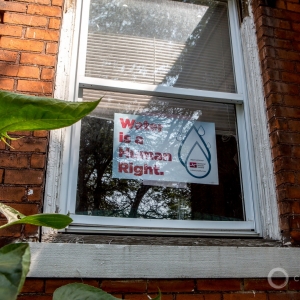Federal Water Tap, December 14: Defense Bill Contains Climate and Water Provisions
The Rundown
The NDAA requires climate risk assessments and provides funding for PFAS health studies. The EPA issues draft guidance for interpreting a U.S. Supreme Court decision on groundwater pollution and the Clean Water Act. The Senate passes a bill to set up a low-interest loan fund for local projects that reduce the risk of disasters. Senate committee advances a bill to expand a tribal drinking water improvement program. The Bureau of Reclamation does not recommend a replacement for a brine injection well in western Colorado that has caused earthquakes. The secretary of the Interior recommends raising a dam in Idaho. The EPA renews the charter of the Great Lakes Advisory Board for two years. And lastly, a company that provides exchange-traded funds petitions the Securities and Exchange Commission to list a fund based on a new futures market for water in California.
“We just have to be thinking forward, and when you think forward, you actually save money.” — Sen. Gary Peters (D-MI), speaking with 9&10 News about the STORM Act, a bill that passed the Senate last week. The bill authorizes $200 million to create a revolving loan fund for financing local projects that reduce disaster risk. Administered by FEMA, the fund would be modeled after similar financial vehicles for water and sewer infrastructure.
By the Numbers
6 feet: Height by which the Bureau of Reclamation recommends raising Anderson Ranch Dam, which is on the South Fork of the Boise River, in Idaho. The purpose is to increase water storage capacity by 29,000 acre-feet. The next step for the project is to complete a companion environmental impact statement and to secure funding from Congress.
News Briefs
Climate and Water Provisions in Defense Spending Bill
The National Defense Authorization Act passed the Senate.
The massive spending bill also sets Department of Defense policy. The package includes a provision requiring the department to update its adaptation strategy for extreme weather and rising seas. It requires a report on the effects of climate change on the Coast Guard.
The bill also includes $15 million for a CDC study into the health effects of PFAS-contaminated drinking water on military bases. In addition, it prohibits the department from purchasing items containing PFOA or PFOS, and requires that farm operators near military bases be notified if they are at risk of using PFAS-contaminated groundwater.
Tribal Water Infrastructure
The Senate Indian Affairs Committee advanced a bill that would enlarge a federal drinking water improvement program on tribal reservations.
The Western Tribal Water Infrastructure Act would increase spending on the program to $30 million annually (up from $20 million) and expand the program to include 10 projects in the Columbia River basin. The federal government would fund 100 percent of the costs.
Though an authorized program, Congress has not yet appropriated any funds for it. The expanded program was proposed by Oregon senators, who noticed chronic drinking water problems on the Warm Springs Indian Reservation.
Salt-Control Project in Colorado River Basin
The Bureau of Reclamation issued a final environmental impact statement that recommends taking no action to upgrade equipment that moderates salt levels in the waters of the Colorado River to improve water quality.
The Paradox Valley Unit removes salts from groundwater before the water enters a tributary of the Colorado River. The brine is then injected deep underground. The well has been shut down since March 2019 because it was causing earthquakes in the area.
The injection well is nearing the end of its designed life. Instead of recommending a replacement, the Bureau of Reclamation suggested taking no action at the moment and using the existing well until it is “no longer operable.”
Studies and Reports
Groundwater Pollution Permitting
The U.S. Environmental Protection Agency published draft guidance to clarify a U.S. Supreme Court ruling on groundwater pollution.
The court said that in some cases, Clean Water Act permits would be required when pollutants discharged to groundwater make their way into rivers, lakes, and the ocean. The case was prompted by a lawsuit in Maui over wastewater injection wells.
At least one legal observer notes that the guidance could be rescinded when the Biden administration takes office.
Public comments on the guidance are due January 11 and should be filed at www.regulations.gov using docket number EPA-HQ-OW-2020-0673.
When Is a Disaster Federally Declared?
FEMA is proposing to change the thresholds that determine when a state is eligible for federal disaster assistance.
The changes are intended to avoid declaring federal disasters for small events that states can handle with their own resources. FEMA argues that setting the thresholds too low acts as a “disincentive” for states to invest in their own capabilities and undermines the agency’s capacity for responding to large disasters.
On the Radar
Water Investments
A company that focuses on exchange-traded funds for agricultural commodities like corn and soybeans is stepping into the water market.
Last week, an index for water futures contracts began trading on the Chicago Mercantile Exchange. The price of the index is based on futures contracts that are linked to the price of water leases in five water markets in California.
Now, Teucrium Trading, a provider of agricultural ETFs, has petitioned the Securities and Exchange Commission to list shares of its Water Fund on the NYSE Arca exchange. The fund consists of a basket of futures contracts that are traded on the CME that have different expiration dates.
Public comments are being accepted through January 4. Send them to rule-comments@sec.gov with File Number SR-NYSEArca-2020-105 in the subject line.
In context: Water Futures to Start Trading amid Growing Fears of Scarcity
Great Lakes Advisory Board
The EPA renewed the board’s charter for two years. The board advises the agency on matters related to the Great Lakes.
Federal Water Tap is a weekly digest spotting trends in U.S. government water policy. To get more water news, follow Circle of Blue on Twitter and sign up for our newsletter.
Brett writes about agriculture, energy, infrastructure, and the politics and economics of water in the United States. He also writes the Federal Water Tap, Circle of Blue’s weekly digest of U.S. government water news. He is the winner of two Society of Environmental Journalists reporting awards, one of the top honors in American environmental journalism: first place for explanatory reporting for a series on septic system pollution in the United States(2016) and third place for beat reporting in a small market (2014). He received the Sierra Club’s Distinguished Service Award in 2018. Brett lives in Seattle, where he hikes the mountains and bakes pies. Contact Brett Walton





Leave a Reply
Want to join the discussion?Feel free to contribute!